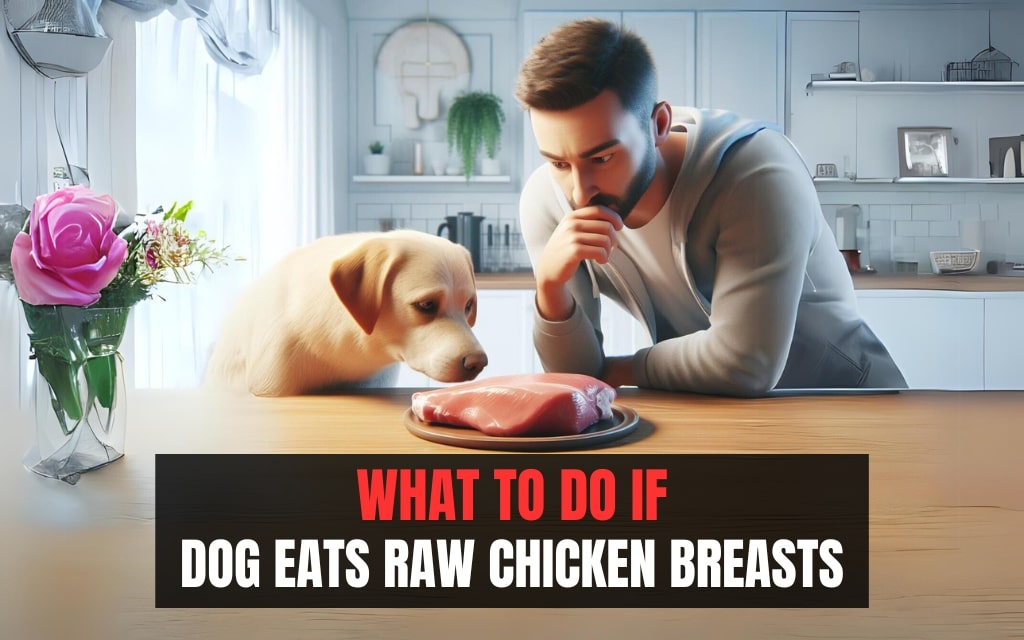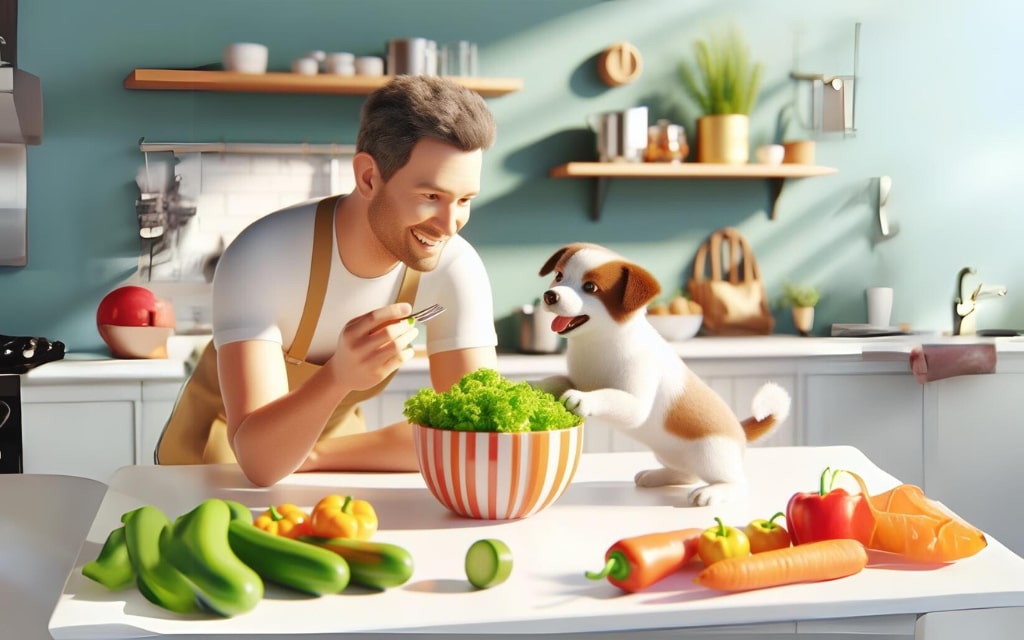
Have you ever found yourself in a panic, thinking, “What to do if dog eats raw chicken breasts?” You’re not alone. This is a common concern among dog owners, given the potential risks associated with dogs consuming raw chicken breasts. These risks primarily stem from harmful bacteria such as Salmonella, Campylobacter, and E. coli, which can be present in raw chicken and lead to food poisoning in dogs.
It’s crucial to understand the immediate steps to take and how to prevent future incidents. This article will guide you through the essential actions and preventive measures to ensure your dog’s safety and health.
Table of Contents
1. What to Do if Your Dog Eats Raw Chicken Breasts?

Induce Vomiting (Optional):
In some cases, inducing vomiting is recommended shortly after your dog has ingested raw chicken breasts. This can be done using 3% hydrogen peroxide, but it’s crucial to first consult with a vet, as inducing vomiting can be harmful in certain situations.
The amount of hydrogen peroxide used should be proportionate to your dog’s weight, and it’s advisable to only use this method under veterinary guidance.
Give Your Dog Activated Charcoal (Optional):
Activated charcoal can help in absorbing toxins that may be present in the raw chicken. It’s a useful emergency treatment if you cannot immediately reach a vet. However, it’s important to use the correct dosage, and administering it without professional advice can be risky.
Feed Your Dog a Bland Diet:
After an incident where your dog eats raw chicken breasts, their digestive system might be sensitive. A bland diet, consisting of easily digestible foods like boiled chicken (fully cooked) and white rice, can help soothe their stomach.

Eating small, frequent meals is more beneficial compared to consuming larger portions. Including canned pumpkin (not pumpkin pie filling) can aid in digestion due to its fiber content.
Monitor Your Dog for Symptoms:
Watch your dog closely for any signs of illness. Symptoms of bacterial infection from raw chicken can include vomiting, diarrhea, lethargy, fever, loss of appetite, and abdominal pain.
In some cases, dogs might show signs of more severe conditions such as dehydration, electrolyte imbalance, intestinal obstruction, pancreatitis, liver disease, or kidney disease.
Contact Your Veterinarian if Symptoms Worsen:
If any concerning symptoms appear or if your dog’s condition deteriorates, contact your vet immediately. In severe cases, treatments like antibiotic therapy, intravenous fluids, hospitalization, and supportive care might be necessary. Always err on the side of caution and seek professional medical advice.
2. The Dangers Of Dogs Eating Raw Chicken Breasts
Chicken Breasts can pose potential health risks to dogs if consumed. Raw poultry may contain harmful bacteria such as Salmonella or Campylobacter, which can lead to severe digestive issues and even food poisoning in dogs.
These bacteria can not only affect the dog’s overall health but also pose a risk to human family members through cross-contamination. It is crucial to ensure that dogs are not exposed to raw chicken breasts and that their diet consists of properly cooked and safe food options to safeguard their well-being.
Additionally, chicken bones should always be avoided as they can splinter and cause choking or blockage in the digestive tract. To ensure dogs receive adequate nutrition, owners should consult a certified veterinarian to create a tailored diet plan. This will guarantee that your dog receives the necessary nutrients and always stays healthy.

Furthermore, it is also important to remember to check the labels on all food products before giving it to your dog. This is especially important when giving treats or snacks, as many of these items may contain certain ingredients that can be harmful to dogs.
Therefore, research should be done beforehand to determine if the treat or snack is appropriate and safe for canine consumption. By doing so, owners can make informed decisions when choosing snacks and treats for their dogs.
All in all, providing a balanced diet and supplementing it with appropriate snacks can ensure that your pup remains healthy and happy for years to come.
To make sure your pet gets the most out of his/her diet, remember to consult a certified veterinarian before making any changes or introducing new foods into the mix.
3. How to Prevent Food Poisoning in Dogs:
If You Are Aware About What To Do If Dog Eats Raw Chicken Breasts, Then Now You Also Need To Learn How to Prevent Food Poisoning in Dogs.

Safely Handle Raw Meat and Store It Properly:
Preventing your dog from eating raw chicken breasts starts with proper handling and storage of raw meat. Keep raw chicken out of reach of pets, and store it securely in the refrigerator or freezer.
Wash Your Hands Thoroughly After Handling Raw Meat:
Good hygiene practices are essential. Always wash your hands thoroughly after handling raw meat to prevent the spread of bacteria around your home and to your pets.
Avoid Feeding Dogs Raw Chicken Bones:
Raw chicken bones can be harmful to dogs, causing choking hazards or internal injuries. also present a potential hazard of bacterial contamination.
Choose Safe and Nutritious Food for Your Dog:
Select high-quality commercial dog foods that meet your dog’s nutritional needs. Consult with your vet to choose the best diet for your pet.
Keep Your Dog Up-to-Date on Vaccinations and Deworm Them Regularly:
Regular vaccinations and deworming play a crucial role in preventing various diseases and infections in dogs. Keeping up with your dog’s vaccination schedule is vital for their overall health.
Prevent Your Dog from Scavenging for Food and Teach Them Not to Eat Raw Meat:
Training your dog not to scavenge and teaching them what is safe to eat is an important aspect of prevention. Consistent training and supervision can reduce the risk of your dog ingesting harmful substances.
4. The Signs and Symptoms of Food Poisoning in Dogs:
Being aware of the signs of food poisoning in dogs is crucial for timely intervention. It is important to note that symptoms can vary in their severity, ranging from mild to severe. This information could potentially be crucial in determining the best course of action to take.:
- Vomiting and Diarrhea: These are common symptoms of gastrointestinal upset and can lead to dehydration if not addressed.
- Lethargy: A noticeable decrease in energy or enthusiasm can indicate that your dog isn’t feeling well.
- fever, characterized by an increase in body temperature, can serve as an indication of an underlying infection.
- Loss of Appetite: Refusal to eat is often one of the first signs of illness in dogs.
- Abdominal Pain: Your dog may show discomfort or pain around their abdomen.
In severe cases, these symptoms can escalate to more critical conditions, requiring immediate veterinary care. Always monitor your dog closely and consult your vet if you observe any of these symptoms.
5. What are Alternative Diets for Dogs
Here are some alternative diet options for dogs that you can consider:
Suggest alternative food options for dogs:
When it comes to alternative food options, you can explore homemade meals using fresh, high-quality ingredients. Consider options like lean meats (e.g., chicken, turkey, beef), fish, and eggs. Vegetables such as carrots, green beans, and sweet potatoes can also be included in their diet.
Balanced diets:
A balanced diet is crucial for your dog’s overall health and well-being. Ensure that their meals contain a proper balance of proteins, carbohydrates, and fats. Including essential nutrients like vitamins and minerals is equally important. Consulting with a veterinarian or a professional animal nutritionist can help you create a balanced diet plan for your dog.
Commercial pet food suggestions:
If you prefer commercial pet food, look for options that are labeled as nutritionally complete and balanced for your dog’s specific life stage (e.g., puppy, adult, senior). Consider reputable brands that prioritize high-quality ingredients and follow quality control measures. It’s a good idea to read the ingredient list and understand what goes into the pet food you choose.
Remember, every dog’s dietary needs can vary, so it’s important to consult with a veterinarian before making any significant changes to their diet.
Conclusion:
In summary, if you find yourself in a situation where you’re saying, What To Do If Dog Eats Raw Chicken Breasts? important to bear in mind that taking prompt and suitable actions can make a significant difference. Initially, you may consider inducing vomiting or giving activated charcoal, but always under veterinary guidance.
Transitioning your dog to a bland diet and closely monitoring for any signs of distress, such as vomiting, diarrhea, lethargy, fever, loss of appetite, or abdominal pain, is imperative. Should any of these symptoms manifest or worsen, contacting your veterinarian immediately is the safest course of action.
Prevention is always better than cure. Safeguarding your dog from food poisoning involves proper handling and storage of raw meat, maintaining good hygiene, selecting appropriate diets, and staying up-to-date with vaccinations and deworming schedules. Additionally, training your dog not to scavenge and to avoid eating raw meat is essential.
If your dog has eaten raw chicken breasts, your prompt response can make a significant difference in their well-being. Don’t hesitate to seek professional advice. Remember, the health and safety of your furry friend always come first. Contact your veterinarian without delay for any concerns regarding your dog’s health.
FAQs:
1. What are the risks of dogs eating raw chicken breasts?
Eating raw chicken breasts can expose dogs to harmful bacteria like Salmonella, Campylobacter, and E. coli, causing food poisoning. It can also lead to gastrointestinal issues and, in severe cases, more serious health problems like pancreatitis.
2. What are the signs and symptoms of food poisoning in dogs?
Symptoms of food poisoning in dogs include vomiting, diarrhea, lethargy, fever, loss of appetite, and abdominal pain. Severe cases may lead to dehydration and more critical health issues.
3. What should I do if my dog eats raw chicken breasts?
If your dog eats raw chicken breasts, monitor them for any signs of illness. In case of symptoms like vomiting or diarrhea, consult your veterinarian immediately. Providing a bland diet can help soothe their stomach.
4. How can I prevent my dog from eating raw chicken breasts?
To prevent your dog from eating raw chicken breasts, store the meat securely, practice good hygiene, supervise your dog, train them not to scavenge, and provide a balanced diet.
Related Posts:
1. What to Do If Dog Ate Small Piece of Onion
2. What To Do If Cat is Choking?


